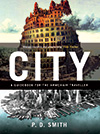BBC radio interview
19 July 2007 | C-bomb, cold war, Doomsday Machine, Doomsday Men, Dr Strangelove, Kubrick | 7 comments
Mark Whitaker has interviewed me about Doomsday Men and the Cold War for The World Today, a current affairs program on the BBC World Service.
The interview includes some fascinating audio clips from their archives - descriptions of the Nagasaki atomic bomb, one by a worker in the shipyard and one from Captain Leonard Cheshire who witnessed the explosion from the air, as well as President Kennedy talking about the Soviet resumption of nuclear tests.
There is also a clip from Kubrick's classic film Dr Strangelove - the moment when the Russian Ambassador describes the Doomsday Machine...
You can listen to my interview below.[audio:World_Today_Doomsday_Men.mp3]


Alan Summers | 19 July 2007
Good interview!
PD Smith | 19 July 2007
Glad you liked it...
shannon | 19 July 2007
Great interview, Peter! Some good points you have about our current societies not understanding the real threat of "doomsday devices" because we haven't experienced the fear of them first hand. I'd have to answer the last question with simply "fear". That is what we should be afraid of now. Fear is the thing that makes us wall ourselves off from each other, and fear is the thing that makes us keep building bigger weapons to protect ourselves from each other. Isn't it ironic that security is the very thing that fear takes away?
PD Smith | 20 July 2007
Thanks Shannon. Yes, I talk about "fear" in my book. Do you know Cecil Day-Lewis's poem "Bombers" (1938)? He describes the bombs in their bomb bays as "the iron-embryo conceived in fear"...
Peter Cowlam | 23 July 2007
You say nuclear weapons are obscene (and I agree), and you would like to see them abolished (and I sympathise), but isn't it the case that the genie is out of the bottle and we're stuck with them?
PD Smith | 23 July 2007
Good to hear from you Peter.
Until recently I assumed that there was a consensus that these weapons - like chemical and biological ones - should be controlled by treaty and then banned. But now it seems new ones are being developed, even by our own country! That's rather depressing. It seems to me that if we learnt anything from the cold war it was that we won't find answers to the world's problems in weapons of mass destruction.
I'd be interested to know what you think though...
Peter Cowlam | 24 July 2007
The problem with international treaties is that it takes only one signatory to suspect that one or more others are cheating, and cheating becomes manifest and proliferates. It's a question less of innate human wickedness than innate human mistrust. This is one consequence, I think, of a world divided by borders, ethnicity, Otherness.